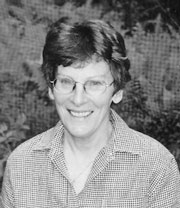By Jane Van Ingen
Maureen Brady started writing about relationships between women in the late 70s. In 1979, her first novel, ‘Give Me Your Good Ear,’ was published by Spinsters Ink, a press she co-founded after struggling to get her novel published. Far from being a vehicle for self-promotion, Spinsters Ink published other important authors, such as Audre Lorde, because “there was a tremendous need for women writers to get published.”
Unlike many small presses, Spinsters Ink was bought by a Colorado-based press last year and is still around. “I’m proud of the fact that it’s still there. We did a good job of turning it over,” Brady said.‘Folly,’ her second novel published in the early `80s and nominated for the ALA Gay Book Award, is about women working in a factory in North Carolina who fight for benefits, black and white women working together and a relationship that blossoms between two of the workers. Brady grew up working-class in upstate N.Y. and Florida, not North Carolina, but the novel tackles many issues ignored by mainstream presses.
Her latest novel, ‘Ginger’s Fire,’ is her first book since, ‘Question She Put to Herself,’ a collection of short stories about her experiences in the lesbian/feminist community in the late `70s and early `80s. (Brady has also written three non-fiction books.)
Though not autobiographical, Ginger’s Fire is about a couple that renovates a house only for the house to burn down and the relationship to go south. A coming-of-age story that happens later in life, Ginger uses the experience to redefine herself.
As a child, Brady was impressed watching her father work as a volunteer fire chief. Parts of an earlier, unpublished novel, which is also about a woman whose life and long-term relationship fall apart, found its way into her new work. Ironically, Brady is now renovating a house in the Catskills with her partner and jokes, “Will that house burn down?”
Brady splits her time between the Catskills and the Village, where she has lived since she was in her 20s. “The `60s was a very fertile time with the anti-war movement and the women’s movement that was getting its second wind,” Brady explained. “It represented questioning and energy. I hadn’t grown up in a radical family and was baffled and excited by all the activism.”
Though times have changed, Brady is still influenced by the Village. References to Sheridan Square and other local landmarks are found in Ginger’s Fire. A professor at NYU for seven years, Brady teaches fiction and non-fiction courses and has helped first-time writers get published.
When Danielle Ofri, a doctor at Bellevue, took one of Brady’s classes at NYU, “I knew right away that there was a book there when all she had were a series of essays,” Brady explained. “After one of Ofri’s essays was published in the Missouri Review, it brought a chain of events that led to the publication of her book, ‘Singular Intimacies: Becoming a Doctor at Bellevue,’ by the Beacon Press.”
As a board member of the New York Writers Workshop, Maureen Brady works with other writers to create a curriculum of writing classes. When one of the other writers was no longer available to teach a class called “Writing Your Story: A Workshop for Adults Over 50,” at the Jewish Community Center of Manhattan, Brady took over. (She also teaches a class at JCC for writers interested in starting and developing a novel.)
The class meets from noon until 2 p.m. on Thursdays. It’s a mixed bag of retirees, professionals on their lunch hour and therapists who have clients in the evening. Brady explained that it was a spirited group of “people who have not let themselves write until later in life and have a lot to say.”
Brady is also a freelance editor. In the late `80s, she assisted Paula Martinac with her first novel, ‘Out of Time,’ about a woman who becomes intrigued by an antique photo book of lesbian couples from the `20s. Martinac won a Lambda Literary award and is now a successful author and syndicated columnist.
“A lot of people who succeed in getting published are writing about things that are out of the ordinary,” Brady said.






































